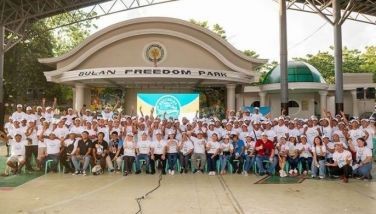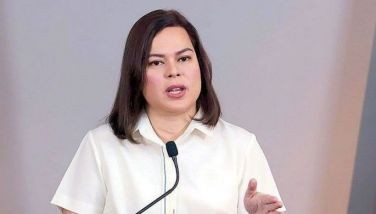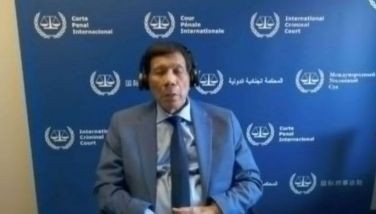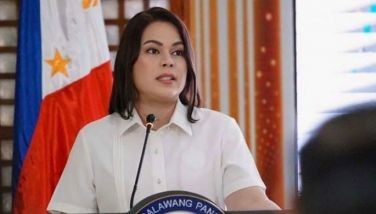Reaching out to those in need

August 9, 2003 | 12:00am
In this country we have 400,000 Filipinos who are blind. One million two hundred thousand are physically handicapped. 800,000 are mentally retarded. Another 800,000 are mentally ill, 120,000 are deaf. Another 120,000 are suffering from cerebral palsy. 440,000 are emotionally disturbed, severely. 80,000 are autistic. And 40,000 are Hansenites; they have leprosy.
Many Filipinos are terminally ill, but they can not afford to buy medicine, not even pain killers. They can not afford a doctor, or even a nurse. They wander through the streets of the city, living as best they can, bearing the pain, until God calls them home.
You might feel bad because you do not have a TV set in your bedroom – 26 inches, color, with a video player, a CD player, and cable. But if you had three TV sets in your home, and you are blind – you would really know what it is to be poor.
You might feel bad because you do not own a car. But if you had three luxury cars in your garage, and you were paraplegic then you would know what it really means to be poor.
The Catholic Bishops’ Conference of the Philippines has an Episcopal Commission on Health Care. The driving force in this Commission, the Bishop in charge of it, for the last fifteen years, was Archbishop Diosdado Talamayan, of Tuguegarao. On July 11, 1989 – 14 years ago – he founded an organization to take care of the deaf. In 1994, he founded another organization "to develop the handicapped". Now they are reaching out – in an orderly, systematic way – to the disabled on all fronts: the blind, the retarded, the mentally ill, the autistic, the lepers. After long years of labor, he has yielded the leadership of this Commission to Bishop Patricio Alo, of Mati. At the moment the Commission is trying to provide medicines for the poor. Especially for the terminally ill.
On December 8, 1993, Father Luke R. Moortgat, C.I.C.M., was appointed secretary to the Commission on Health Care. He is Flemish by blood, born in Belgium on August 20, 1959. He entered the Congregation of the Immaculate Heart of Mary, studied in the United States, and became an American citizen. He was ordained in 1965, and went to the Belgian Congo, in Africa, as a missionary in 1966. Ten years later Mobatu abolished all private education in the Congo, and closed the C.I.C.M. schools. So Father Moortgat came to the Philippines.
His educational background is in education, majoring in evaluation and research. He studied the micro-computer as soon as it appeared. He is scholarly, orderly, systematic, an expert in statistics. He studied at the University of Detroit, a Jesuit school. And his introduction to the disabled, to the handicapped, began with another Jesuit – Father Pierre Tritz, S. J.
It started with the deaf – first by saying Mass for them, then by learning the sign language, and then by hiring the deaf to work with him, on computers, when he was chaplain of de la Salle University on Taft Avenue, Manila. In January of 1988 he began to teach the sign language. And on September 18, 1988 His Eminence Jaime L. Cardinal Sin appointed him as Chaplain for the deaf in the Archdiocese of Manila. Whenever there is an Archdiocesan celebration in Manila, you see Father Luke Moortgat on the altar, translating the proceedings in sign language, for the deaf.
There are 450,000 handicapped Filipinos who need special education. In a patient, persevering effort to awaken the nation to their existence, and their dire needs, Father Moortgat is constantly organizing Congresses, Conventions, Conferences and Symposia on how to help the disabled.
In January of this year, 2003, he organized a Congress on Mental Retardation and a full day for the instruction of interpreters for the deaf. In February he held a Congress on Blindness, and a Convention on Special Education for the handicapped. In March he organized a Symposium on Care for the Mentally Ill, and another Symposium on Care for the Aged. In April he held a Congress on Care for the Physically Handicapped. In July a Symposium on Progressive Diseases, like multiple solerosis; and another Symposium on Care for the Terminally Ill. And all year long he is conducting classes on the Sign Language. His students are divided into three separate levels.
Right now, his most pressing concern is a Project of the Episcopal Commission on Health Care, under the Catholic Bishops’ Conference of the Philippines, to provide low cost medicines for the poor. In fact, to provide low cost medicines for all who are sick, because the cost of medicine is high, even for the normal Filipino family.
The project has been in operation for a year. It is incorporated, approved by the Securities and Exchange Commission, with a license from the Bureau of Food and Drugs, for both wholesale and retail. Their retail price is one third lower than the retail price in the drug stores. And their wholesale price – including the cost of shipment to any place in the country – is 45 percent lower than the wholesale price of the drug companies.
This is possible because they do not advertise except through news letters; they decrease the number of middlemen; they eliminate red tape; they have reduced the cost of administration; and they do not make a profit. In brief, this Episcopal Commission on Health Care is trying to bring the love of God to the poor in the concrete service of making available low cost medicines all over the country.
They have an eight-page price list, and an order form, showing exactly what they have to offer, and precisely how much each medicine will cost. In anti-biotics, for instance, they have amoxicillin in capsules for adults, and in drops for children. They have carbocisteine in capsules and in drops. They have dimenhydrinate, diphenhydramine and dipyridamole; paracetamol in tablets, capsules and drops – all the common, ordinary medicines that are in constant demand.
For those who buy wholesale, their only requirement is that the final retail price must always be at least one-third lower than the retail price in the ordinary store.
Our media gives a tidal wave of publicity to charges made against priests and Bishops, but you seldom hear of the good priests, like Father Moortgat, who are working selflessly, night and day, to help the children of God who are in real, desperate need. This is how to contact him:
Fr. Luke R. Moortgat, CICM,
Episcopal Commission on Health Care,
c/o de la Salle University, Room LS 156,
2401 Taft Avenue, Manila
Mailing Address: P.O. Box 4453
1000 Manila
Telephone: 521-58-76
Telefax: 02-521-08-27
Text: 0920-211-34-25
E-mail: totalhealth@hotmail.com
HealthHandicap@skynet.net
Many Filipinos are terminally ill, but they can not afford to buy medicine, not even pain killers. They can not afford a doctor, or even a nurse. They wander through the streets of the city, living as best they can, bearing the pain, until God calls them home.
You might feel bad because you do not have a TV set in your bedroom – 26 inches, color, with a video player, a CD player, and cable. But if you had three TV sets in your home, and you are blind – you would really know what it is to be poor.
You might feel bad because you do not own a car. But if you had three luxury cars in your garage, and you were paraplegic then you would know what it really means to be poor.
The Catholic Bishops’ Conference of the Philippines has an Episcopal Commission on Health Care. The driving force in this Commission, the Bishop in charge of it, for the last fifteen years, was Archbishop Diosdado Talamayan, of Tuguegarao. On July 11, 1989 – 14 years ago – he founded an organization to take care of the deaf. In 1994, he founded another organization "to develop the handicapped". Now they are reaching out – in an orderly, systematic way – to the disabled on all fronts: the blind, the retarded, the mentally ill, the autistic, the lepers. After long years of labor, he has yielded the leadership of this Commission to Bishop Patricio Alo, of Mati. At the moment the Commission is trying to provide medicines for the poor. Especially for the terminally ill.
On December 8, 1993, Father Luke R. Moortgat, C.I.C.M., was appointed secretary to the Commission on Health Care. He is Flemish by blood, born in Belgium on August 20, 1959. He entered the Congregation of the Immaculate Heart of Mary, studied in the United States, and became an American citizen. He was ordained in 1965, and went to the Belgian Congo, in Africa, as a missionary in 1966. Ten years later Mobatu abolished all private education in the Congo, and closed the C.I.C.M. schools. So Father Moortgat came to the Philippines.
His educational background is in education, majoring in evaluation and research. He studied the micro-computer as soon as it appeared. He is scholarly, orderly, systematic, an expert in statistics. He studied at the University of Detroit, a Jesuit school. And his introduction to the disabled, to the handicapped, began with another Jesuit – Father Pierre Tritz, S. J.
It started with the deaf – first by saying Mass for them, then by learning the sign language, and then by hiring the deaf to work with him, on computers, when he was chaplain of de la Salle University on Taft Avenue, Manila. In January of 1988 he began to teach the sign language. And on September 18, 1988 His Eminence Jaime L. Cardinal Sin appointed him as Chaplain for the deaf in the Archdiocese of Manila. Whenever there is an Archdiocesan celebration in Manila, you see Father Luke Moortgat on the altar, translating the proceedings in sign language, for the deaf.
There are 450,000 handicapped Filipinos who need special education. In a patient, persevering effort to awaken the nation to their existence, and their dire needs, Father Moortgat is constantly organizing Congresses, Conventions, Conferences and Symposia on how to help the disabled.
In January of this year, 2003, he organized a Congress on Mental Retardation and a full day for the instruction of interpreters for the deaf. In February he held a Congress on Blindness, and a Convention on Special Education for the handicapped. In March he organized a Symposium on Care for the Mentally Ill, and another Symposium on Care for the Aged. In April he held a Congress on Care for the Physically Handicapped. In July a Symposium on Progressive Diseases, like multiple solerosis; and another Symposium on Care for the Terminally Ill. And all year long he is conducting classes on the Sign Language. His students are divided into three separate levels.
Right now, his most pressing concern is a Project of the Episcopal Commission on Health Care, under the Catholic Bishops’ Conference of the Philippines, to provide low cost medicines for the poor. In fact, to provide low cost medicines for all who are sick, because the cost of medicine is high, even for the normal Filipino family.
The project has been in operation for a year. It is incorporated, approved by the Securities and Exchange Commission, with a license from the Bureau of Food and Drugs, for both wholesale and retail. Their retail price is one third lower than the retail price in the drug stores. And their wholesale price – including the cost of shipment to any place in the country – is 45 percent lower than the wholesale price of the drug companies.
This is possible because they do not advertise except through news letters; they decrease the number of middlemen; they eliminate red tape; they have reduced the cost of administration; and they do not make a profit. In brief, this Episcopal Commission on Health Care is trying to bring the love of God to the poor in the concrete service of making available low cost medicines all over the country.
They have an eight-page price list, and an order form, showing exactly what they have to offer, and precisely how much each medicine will cost. In anti-biotics, for instance, they have amoxicillin in capsules for adults, and in drops for children. They have carbocisteine in capsules and in drops. They have dimenhydrinate, diphenhydramine and dipyridamole; paracetamol in tablets, capsules and drops – all the common, ordinary medicines that are in constant demand.
For those who buy wholesale, their only requirement is that the final retail price must always be at least one-third lower than the retail price in the ordinary store.
Our media gives a tidal wave of publicity to charges made against priests and Bishops, but you seldom hear of the good priests, like Father Moortgat, who are working selflessly, night and day, to help the children of God who are in real, desperate need. This is how to contact him:
Fr. Luke R. Moortgat, CICM,
Episcopal Commission on Health Care,
c/o de la Salle University, Room LS 156,
2401 Taft Avenue, Manila
Mailing Address: P.O. Box 4453
1000 Manila
Telephone: 521-58-76
Telefax: 02-521-08-27
Text: 0920-211-34-25
E-mail: totalhealth@hotmail.com
HealthHandicap@skynet.net
BrandSpace Articles
<
>
- Latest
- Trending
Trending
Latest
Latest

By VIRTUAL REALITY | By Tony Lopez | 3 hours ago

By POINT OF VIEW | By Kathyleen Honculada | 3 hours ago

By THE CORNER ORACLE | By Andrew J. Masigan | 1 day ago
Recommended




























